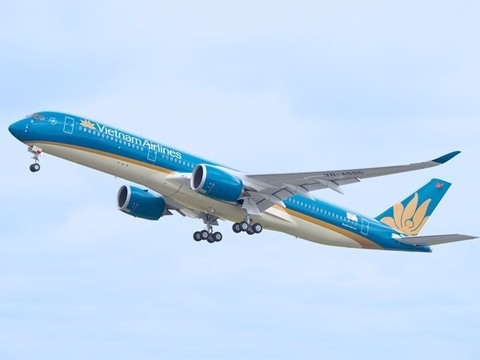
National carrier Vietnam Airlines plans to launch the first direct route between Viet Nam and the United States (US) this year, with the destination being either San Francisco or Los Angeles in California.— Photo courtesy of Vietnam Airlines
National carrier Vietnam Airlines plans to launch the first direct route between Viet Nam and the United States (US) this year, with the destination being either San Francisco or Los Angeles in California.
According to Deputy Director of Civil Aviation Authority of Viet Nam (CAAV) Vo Huy Cuong, the opening of this route is facing many challenges, especially fierce competition among airlines in the US market.
The US airline market is being exploited by many firms, who operate routes from the US to Viet Nam through transit points. There are many options for passengers, as they can fly from the US to Viet Nam via Japan, South Korea, Taiwan, Thailand, Singapore, Hong Kong, mainland China or Malaysia. For example, consider the transit points in Japan and South Korea; each point has two major Japanese and South Korean airlines directly flying to the US, which can connect flights to Viet Nam seamlessly.
Meanwhile, passengers who want to fly to Viet Nam from the US’s eastern region can also transit in European countries, such as United Kingdom, France and Germany, before connecting with flights to Viet Nam.
"The competition is very fierce; so the Vietnamese airlines planning to fly directly to the US must analyse and evaluate the situation carefully," said Cuong.
In addition to economic licences permitted under the Air Transport agreement signed between the US and Viet Nam, the Vietnamese airlines also need a licence granted by the US Federal Aviation Administration (FAA), which is mandatory for all international airlines that want to fly into the US, said Cuong.
To obtain the licence from the FAA, he said the CAAV would have to reach CAT1 or FAA-standard safety supervision requirements, a prerequisite for Vietnamese airlines to start direct flights to the US.
"In October last year, a FAA delegation visited Viet Nam for technical assessment. We will likely invite FAA to visit the country for more evaluation to gain the CAT1 rating," he added.
After making assessment on the CAAV’s safety supervision capacity, FAA will evaluate the Vietnamese airlines, which have proposed to fly directly to the US, such as Vietnam Airlines and Vietjet Air, on their repairing, maintenance and exploitation of aircraft capacity.
National carrier Vietnam Airlines has reached the international 4-star standard after long years of good preparation on their structure, and the capacity of aircraft operation and maintenance. In terms of service quality, Vietnam Airlines has achieved good results.
Though Vietnam Airlines has not started a direct flight to the US, it has earned a huge market, since 2006, through code sharing with other airlines (seven flights a week to 25 cities in the US).
As for technical capability, there must be a rating from the FAA. Once the qualification is met, then it will fly, said Cuong.
“When we are licensed by the FAA, we will have the opportunity to sell more tickets because passengers will feel assured that the Vietnamese airlines have achieved international standards on safety and aviation security. In addition to these, as this is a market with fierce competition, the airlines participating in this route will have to improve the quality of services regularly,” said Cuong.
Currently, passengers travelling from Viet Nam to the US have to make at least one stop in another Asian city, such as Hong Kong, Taipei, Tokyo, Seoul, Shanghai and Beijing, with the total time taken to travel being up to 24 hours.
The US is the fourth largest source of foreign visitors to Viet Nam, with more than 614,000 people coming in 2017, up 11 per cent from 2016, according to the General Statistics Office.
Viet Nam welcomed nearly 13 million foreign visitors and raked in nearly VND515 trillion (US$22.67 billion) from tourism in 2017.
It hopes the new air routes will increase the number of visitors up to 20 million in the next two years, when tourism revenues will contribute 10 to 12 per cent to the country’s GDP, compared with the current 7 per cent. — VNS